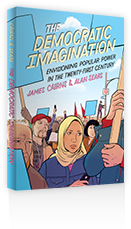We have both taught courses dealing with democratic issues. One thing that often strikes us in these classes is how many students view democracy as something that happens at a distance and doesn't have much to do with their everyday lives. Out there somewhere, politicians make decisions, professional journalists and pundits debate issues, police and courts enforce laws, national armies fight over land and liberty. It is understandable why so many people feel more like spectators than active participants when it comes to democracy. Indeed, the version of democracy taught in schools and reflected on citizenship tests—what we refer to in the book as "official democracy"—assumes that popular power is achieved largely through mass consent to being governed. Citizens choose leaders in periodic elections, but actual decision-making processes and policy choices are carried out by elected and non-elected political representatives and policy experts. And many of the key decisions made that shape our everyday lives are made in corporate offices or by institutional administrators who are not subject to democratic processes.
This sense of democracy at a distance may be one of the reasons that participation in elections is falling in many of the places with established electoral systems to choose governments. We are not the only ones concerned about the fact that more and more people are feeling less and less interested in, if not alienated by, the institutions and systems of official democracy. There is worry across the political spectrum about the growing democratic deficit and the decline of democracy in general. One of the things our book is designed to do is help open up discussions of democracy to address issues of declining participation and perceptions that popular power in current forms of exchange and decision-making might be limited.
One of the ways we do this is to raise the question of whether the official democratic framework is the only way to understand popular power. We open up debates about the meaning and practice of popular power by introducing the frame we call "democracy from below," in which democracy is about masses of people engaging in genuine self-rule in all aspects of life. Chapters in the book introduce debates over core democratic concepts (such as citizenship, representation, bureaucracy, and the line between politics and the economic sphere), as well as key moments in democratic history (for example, the French Revolution, the rise of the welfare state, and the Arab Spring). We also include several text-boxes that bring into sharp contrast different ways of thinking about current issues, such as the Occupy movement, WikiLeaks, and binding referenda. Our approach is intended to provide readers with a sharper view of the core points of contrast in struggles over competing forms of democratic governance. By examining concepts and events from the official-democracy and democracy-from-below perspectives, we show that the same events can look very different, depending upon your core assumptions about what democracy is.
All of this is done in the hopes of helping readers expand their own democratic imaginations. Despite the widespread sense that democracy happens at a distance, in fact, all of us are deeply embedded in democratic systems. Our lives are shaped by political processes, laws, and dominant norms and values, and these processes, laws, and values are reproduced and challenged through our everyday actions. If democracy is to be raised to new heights and flourish—whether in accord with the basic premises of official democracy or democracy from below—more and more people need to develop the tools necessary to define what democracy means to them and take deliberate action in order to achieve it.
It is our sense that this opening up of questions of democracy has become particularly pressing since the economic crash of 2008. In this time, we have seen existing democratic systems challenged in new ways from multiple directions, while elsewhere people have mounted massive mobilizations to win core democratic rights. On the one hand, many political parties and business elites are pushing for new forms of governance more driven by the needs of markets than by the choices of elected representatives. The replacement of the elected Greek government by an unelected technocratic government in 2011 is an example of this trend. Yet, on the other hand, movements from below are attempting to expand the meaning and practice of democracy. New movements for democracy helped topple authoritarian governments in Tunisia, Egypt, and Libya in 2010 and 2011. In 2011, the Occupy Wall Street movement inspired millions of people around the world with its calls for a type of democracy that takes power back from the rich and influential "1%" and places decision-making processes in the hands of the "99%." In Quebec and Chile, hundreds of thousands of people have taken to the streets in support of student movements that have turned into broader movements for greater popular power and social justice.
At a time when democracy is in flux both in theory and practice, it is crucial that people develop their capacity to reflect upon what is at stake in current struggles. The Democratic Imagination was written as a contribution to important debates about what democracy is and how popular power should be expressed. We believe the democratic imagination can affect the way we see the world and encourage more deliberate choices for action.
—James Cairns and Alan Sears
Now is an important
time for people
to be talking
about democracy.
James Cairns and Alan Sears
Paperback $24.95
ISBN 978-1-4426-0528-2
University of Toronto Press

